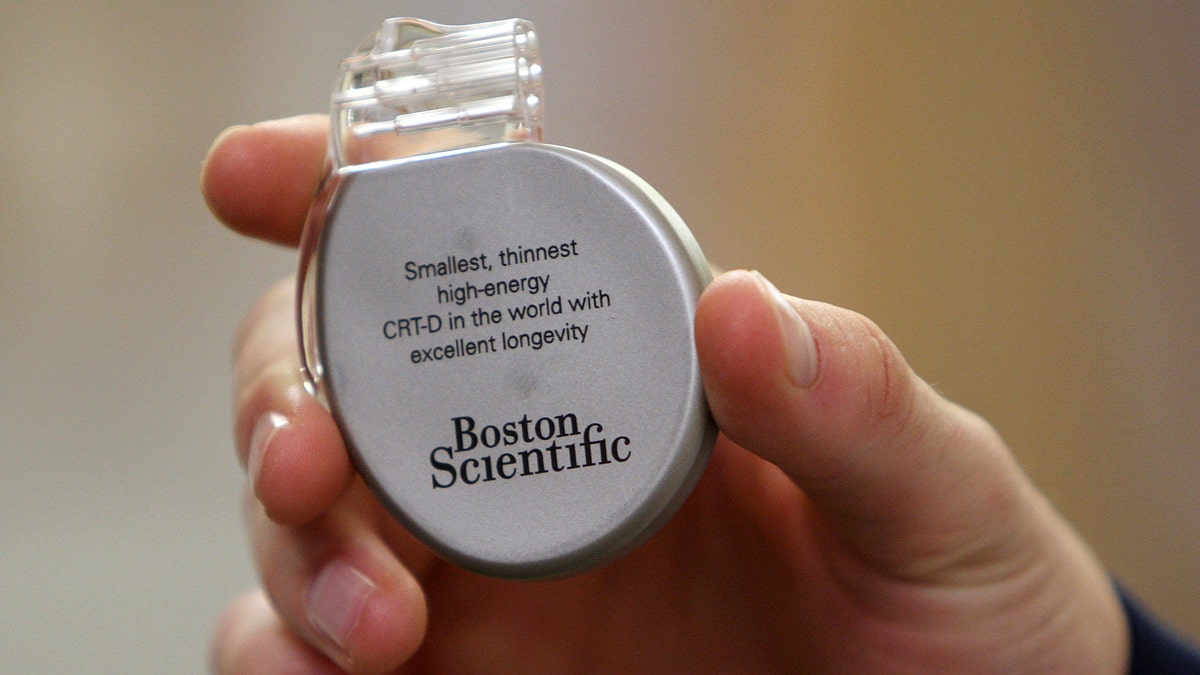
FILE - In this Dec. 7, 2012, file photo, Utah State basketball player Danny Berger holds a defibrillator, like the one implanted in his chest, following a news conference at Intermountain Medical Center in Murray, Utah. New research is challenging medical guidelines that say people with a heart-zapping device in their chests should avoid intense sports like basketball and soccer in favor of golf or bowling. Increasingly, teenagers and younger adults receive these implants, people who may be more active and fit but have some underlying heart abnormality that puts them at risk of an arrhythmia. Last year, Utah State forward Danny Berger collapsed on the basketball court, was revived and had a defibrillator implanted; he has said he hopes to play again. (AP Photo/Deseret News, Ravell Call, File)
Maybe those heart defibrillators can take more of a wallop than you think.
New research is challenging medical guidelines that say people with a heart-zapping device in their chests should avoid intense sports like basketball and soccer in favor of golf or bowling.
Lots of patients ignore that take-it-easy advice and stay in the game, and Monday's findings suggest vigorous exercise may be safe for many of them after all.
A registry tracked 372 people who stuck with competitive sports after having a defibrillator surgically implanted to guard against dangerous irregular heartbeats — and found that the lifesaving device worked when needed despite the physical exertion.
"This is good guidance for many of the sports. It should be reassuring that in fact many people can participate," said Dr. Gordon Tomaselli, a former American Heart Association president who wasn't involved with the new study — and cautions that questions remain.
More than 100,000 defibrillators are implanted in U.S. patients every year, devices that can detect when an abnormal heartbeat is forming and automatically shock the heart to help it get back into rhythm. Most recipients are older people with heart failure, too sick to worry about sports.
But increasingly, teenagers and younger adults receive these implants, people who may be more active and fit but have some underlying heart abnormality that puts them at risk of an arrhythmia. Last year, Utah State forward Danny Berger collapsed on the basketball court, was revived and had a defibrillator implanted; he has said he hopes to play again. Harder still is how to advise people who get the implants as a precaution, before any symptoms of trouble.
The big questions: Do the implants fire properly under the physical duress of competitive sports? Do they emit painful shocks more often? Might they break with a hit to the chest?
To begin finding out, Yale University heart specialist Dr. Rachel Lampert opened a national registry that, over 2½ years, tracked defibrillator patients who decided to stick with sports. They included some high school and college athletes, as well as people who participated in community-level basketball, soccer, tennis and other sports or were runners, skiers, even a few rock climbers.
The implants did have to fire more often during physical activity, whether the people were playing ball or running for the bus. But they did their job — no one died, had to be resuscitated or experienced a shock-related injury, Lampert reported Monday in the journal Circulation.
During the study, 77 people received shocks: 10 percent during sports, 8 percent during other physical activities and 6 percent while resting. About two-thirds who received a shock did return to their sport rather than deciding to give it up, Lampert said.
"Despite the fact that people got shocked, they didn't have anything dangerous happen to them: The device worked," she said.
"It doesn't mean every patient can be doing every sport," Lampert added, advising that implant recipients talk with their doctors first. But, "we probably don't need the blanket restrictions in place."
However, the study is small and Tomaselli, the former heart association president, warned among the top concerns is whether contact sports, such as football and hockey, might loosen the implant. Too few of those patients enrolled in the registry to draw conclusions.
In addition, some patients with a rare heart condition required multiple shocks when they had an irregular heartbeat.
Still, "one of the reasons for having a defibrillator is to restore as much of a normal life as you possibly can," Tomaselli noted. To many people, "taking away competitive athletics is taking away a part of them."
When people do continue sports with the implant, Tomaselli said coaches, family and others must be fully aware of the risks — and there should be an external defibrillator available during competition and practice in case the implant fails and emergency resuscitation is needed.
The study was paid for by three defibrillator manufacturers.
Based on reporting by The Associated Press.
Follow us on twitter.com/foxnewslatino
Like us at facebook.com/foxnewslatino
